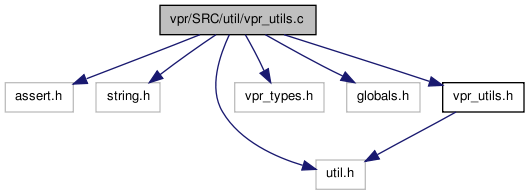vpr/SRC/util/vpr_utils.c File Reference
#include <assert.h>#include <string.h>#include "util.h"#include "vpr_types.h"#include "globals.h"#include "vpr_utils.h" Include dependency graph for vpr_utils.c:
Include dependency graph for vpr_utils.c:Go to the source code of this file.
Functions | |
| void | print_tabs (FILE *fpout, int num_tab) |
| void | sync_grid_to_blocks (INP int num_blocks, INP const struct s_block block_list[], INP int nx, INP int ny, INOUTP struct s_grid_tile **grid) |
| boolean | is_opin (int ipin, t_type_ptr type) |
| void | get_class_range_for_block (INP int iblk, OUTP int *class_low, OUTP int *class_high) |
Detailed Description
This module contains subroutines that are used in several unrelated parts of VPR. They are VPR-specific utility routines.
Definition in file vpr_utils.c.
Function Documentation
| void get_class_range_for_block | ( | INP int | iblk, |
| OUTP int * | class_low, | ||
| OUTP int * | class_high | ||
| ) |
Assumes that the placement has been done so each block has a set of pins allocated to it
Definition at line 135 of file vpr_utils.c.
{
t_type_ptr type;
type = block[iblk].type;
assert(type->num_class % type->capacity == 0);
*class_low = block[iblk].z * (type->num_class / type->capacity);
*class_high =
(block[iblk].z + 1) * (type->num_class / type->capacity) - 1;
}
 Here is the caller graph for this function:
Here is the caller graph for this function:| boolean is_opin | ( | int | ipin, |
| t_type_ptr | type | ||
| ) |
| void print_tabs | ( | FILE * | fpout, |
| int | num_tab | ||
| ) |
print tabs given number of tabs to file
Definition at line 21 of file vpr_utils.c.
{
int i;
for(i = 0; i < num_tab; i++) {
fprintf(fpout, "\t");
}
}
| void sync_grid_to_blocks | ( | INP int | num_blocks, |
| INP const struct s_block | block_list[], | ||
| INP int | nx, | ||
| INP int | ny, | ||
| INOUTP struct s_grid_tile ** | grid | ||
| ) |
Points the grid structure back to the blocks list
Definition at line 31 of file vpr_utils.c.
{
int i, j, k;
/* Reset usage and allocate blocks list if needed */
for(j = 0; j <= (ny + 1); ++j)
{
for(i = 0; i <= (nx + 1); ++i)
{
grid[i][j].usage = 0;
if(grid[i][j].type)
{
/* If already allocated, leave it since size doesn't change */
if(NULL == grid[i][j].blocks)
{
grid[i][j].blocks =
(int *)my_malloc(sizeof(int) *
grid[i][j].type->
capacity);
/* Set them as unconnected */
for(k = 0; k < grid[i][j].type->capacity;
++k)
{
grid[i][j].blocks[k] = OPEN;
}
}
}
}
}
/* Go through each block */
for(i = 0; i < num_blocks; ++i)
{
/* Check range of block coords */
if(block[i].x < 0 || block[i].x > (nx + 1) ||
block[i].y < 0
|| (block[i].y + block[i].type->height - 1) > (ny + 1)
|| block[i].z < 0 || block[i].z > (block[i].type->capacity))
{
printf(ERRTAG
"Block %d is at invalid location (%d, %d, %d)\n",
i, block[i].x, block[i].y, block[i].z);
exit(1);
}
/* Check types match */
if(block[i].type != grid[block[i].x][block[i].y].type)
{
printf(ERRTAG "A block is in a grid location "
"(%d x %d) with a conflicting type.\n", block[i].x,
block[i].y);
exit(1);
}
/* Check already in use */
if(OPEN != grid[block[i].x][block[i].y].blocks[block[i].z])
{
printf(ERRTAG
"Location (%d, %d, %d) is used more than once\n",
block[i].x, block[i].y, block[i].z);
exit(1);
}
if(grid[block[i].x][block[i].y].offset != 0)
{
printf(ERRTAG
"Large block not aligned in placment for block %d at (%d, %d, %d)",
i, block[i].x, block[i].y, block[i].z);
exit(1);
}
/* Set the block */
for(j = 0; j < block[i].type->height; j++)
{
grid[block[i].x][block[i].y + j].blocks[block[i].z] = i;
grid[block[i].x][block[i].y + j].usage++;
assert(grid[block[i].x][block[i].y + j].offset == j);
}
}
}
 Here is the call graph for this function:
Here is the call graph for this function: Here is the caller graph for this function:
Here is the caller graph for this function:




